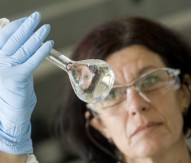
Healthy Brain – Healthy Europe
Designated as the ‘European Month of the Brain’, May 2013 saw over 50 events across the continent concerning brain research. This special month of events sought to raise public awareness about the human organ, showcase European research achievements and outline future research objectives.
Speaking to delegates at the ‘Healthy Brain: Healthy Europe’ conference in Dublin, Ireland, Máire Geoghegan-Quinn, the European Commissioner for Research, Innovation and Science, outlined how brain-related diseases presented some of the greatest social challenges facing Europe today, beginning with personal suffering.
“Around 165 million people in Europe are affected annually by some form of brain-related disorder; this means that almost every family in Europe is likely to be affected. In terms of science, the brain is our most complex organ and brain research is one of the frontiers of modern science. A better understanding of the brain is desperately needed to accelerate the development of new drugs and better treatments.
“In terms of the economy: in the last few years, several pharmaceutical companies reduced or closed their neurosciences R&D facilities because the development of drugs takes too long, is too expensive and too risky. Fewer drugs are being developed and at higher cost. In terms of socioeconomic costs: the costs generated by brain disorders reached almost €800bn in 2010, a figure that will no doubt increase as our population ages. In terms of healthcare, many brain disorders are chronic and progressive diseases that require long-term treatment. They’re already putting pressure on our healthcare systems.”
Europe 2020 & FP7
The Europe 2020 strategy focuses on encouraging economic growth, creating new jobs, increasing industrial competitiveness, improving quality of life and encouraging social inclusion. The plan targets many of the challenges facing European society and research sectors regarding the brain.
“Brain research and innovation contribute to Europe 2020‘s aims, not just by improving quality of life and helping integrate patients back into their social and working lives, but also by creating jobs and increasing competitiveness through innovative new products such as medicines, diagnostics, nanotechnologies and robotics. Healthy brains are essential for happy individuals and families, for an efficient work force, for innovative products and services – in short, for a healthy European society. Therefore, investment in brain research is an intelligent investment, especially in times of scares resources, as it can help avoid even higher costs to society in the future,” Geoghegan-Quinn said.
The Seventh Framework Programme has seen nearly €2bn invested in 1,200 brain research projects, with the most recent call adding an extra €150m in investment. Additional funding for pioneering and frontier research has also been provided by the European Research Council (ERC) as well as the Marie Skłodowska-Curie fellowships, which have encouraged brain researchers to share knowledge and train in the best laboratories.
Geoghegan-Quinn continued: “Collaborative research has been a cornerstone of FP7-supported brain research, in particular for research on mental health disorders and neurodegenerative diseases. Collaborative research provides the best opportunities for multidisciplinary research, a more effective springboard to new knowledge and innovative applications. FP7 has also encouraged the pharmaceutical industry and public authorities to work more closely together.”
Announced by Commission Vice-President Neelie Kroes as one of the winning bids for the Future and Emerging Technologies Flagships, the Human Brain Project will see €1bn invested in European brain research from regional, national and European sources. This project will focus on better understanding how the brain works through building new computing technologies.
Horizon 2020 & collaboration
Investment in brain research will continue under Horizon 2020. A significant amount of research funding will be allocated under the Societal Challenges pillar.
“One of the major new features is a challenge-based approach that concentrates on creating the knowledge and innovation to solve major problems. ‘Health, demographic change and wellbeing’, the largest societal challenge addressed by Horizon 2020, will be the natural home for much of the brain research to be supported by Horizon 2020. However, the challenge-based, cross-sectoral approach of Horizon 2020 is ideal for such a broad, multi-disciplinary area as brain research and there will also be opportunities for brain research in the other two pillars, Excellent Science and Industrial Leadership,” the Commissioner detailed.
“Horizon 2020 and the European institutions will certainly play their part, but we need all partners to pull together if we really want to improve brain research and healthcare. This is why the Irish Presidency and the European Commission were keen to ensure a broad mix of stakeholders at this conference: patient organisations and industry, regulatory and funding agencies, representatives of healthcare systems and policy-makers, researchers and charity organisations – they will all have their say.”
Collaboration in research is only the effective way of addressing of many of the challenges facing European society in addition to developing new products and services. Horizon 2020 emphasises research and innovation co-operation between both EU member states and also associated and third countries. By encouraging collaboration and creating the right regulatory environment, many more breakthroughs are likely to emerge.
“When research budgets are tight, countries need to work together, learn together and improve together to get better value, more significant results and bigger impacts. A beginning has been made in FP7 with the ‘Innovative Medicines Initiative Joint Undertaking’, the ‘Joint Programming Initiative on Neurodegenerative Diseases’ and with the Neuron ERA-Net, but more work is needed to align national programmes and activities.
“We as policy-makers must think about effective ways to create an environment that favours research and innovation and encourages industry investment in drug development. Regulatory aspects are particularly challenging for some brain-related diseases, for example as regards patients’ consent but also perceived risks and benefits. We also have to deliberate how to address such issues and how to better take patients’ needs into consideration,” Geoghegan-Quinn told delegates.
“These challenges aren’t just limited to Europe. They’re global challenges, so it’s a good moment to mention that the Commission is a member of the Global Alliance for Chronic Diseases, which has identified mental health as a priority.”
What new drugs and research developments are finally achieved will only be known in the coming months and years.
Commissioner Máire Geoghegan-Quinn




